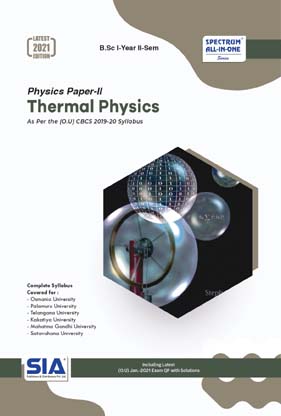

Note: Please check your Spam or Junk folder, in case you didn't receive the email with verification code.
SYLLABUS
UNIT-I
1. Kinetic Theory of Gases Introduction – Deduction of Maxwell’s law of distribution of molecular speeds, Transport phenomena – Viscosity of gases – Thermal conductivity – Diffusion of gases. 2. Thermodynamics Basics of thermodynamics – Kelvin’s and Claussius statements – Thermodynamic scale of temperature – Entropy, Physical significance – Change in entropy in reversible and irreversible processes – Entropy and disorder – Entropy of universe – Temperature – Entropy (T-S) diagram – Change of entropy of a perfect gas – Change of entropy when ice changes into steam.
UNIT-II
3. Thermodynamic Potentials and Maxwell’s Equations Thermodynamic potentials – Derivation of Maxwell’s thermodynamic relations – ClausiusClayperon’s equation – Derivation for ratio of specific heats – Derivation for difference of two specific heats for perfect gas. Joule Kelvin effect – Expression for Joule Kelvin coefficient for perfect and Vanderwaal’s gas. 4. Low Temperature Physics Joule kelvin effect – Liquefaction of gas using porous plug experiment. Joule expansion – Distinction between adiabatic and Joule Thomson expansion – Expression for Joule Thomson cooling – Liquefaction of helium, Kapitza’s method – Adiabatic demagnetization – Production of low temperatures – Principle of refrigeration, vapour compression type.
UNIT-III
5. Quantum Theory of Radiation Black body-Ferry’s black body – Distribution of energy in the spectrum of Black body – Wein’s displacement law, Wein’s law, Rayleigh-Jean’s law – Quantum theory of radiation – Planck’s law – Deduction of Wein’s distribution law, Rayleigh-Jeans law, Stefan’s law from Planck’s law. Measurement of radiation using pyrometers – Disappearing filament optical pyrometer – Experimental determination – Angstrom pyroheliometer – Determination of solar constant, Effective temperature of sun.
UNIT-IV
6. Statistical Mechanics Introduction, postulates of statistical mechanics. Phase space, concept of ensembles and some known ensembles, classical and quantum statistics and their differences, concept of probability, Maxwell-Boltzmann’s distribution law – Molecular energies in an ideal gasMaxwell-Boltzmann’s velocity distribution law, Bose-Einstein Distribution law, Fermi-Dirac Distribution law, comparison of three distribution laws, Application of B-E distribution to Photons – Plancks radiation formula, Application of Fermi-Dirac statistics to white dwarfs and Neutron stars.
 No Preview is available for this book
No Preview is available for this book

 Get 100 instant uPoints on the purchase of Rs.100 or above for each order.
Get 100 instant uPoints on the purchase of Rs.100 or above for each order.
CategoriesGeneral Science

Format PDF

TypeeBook